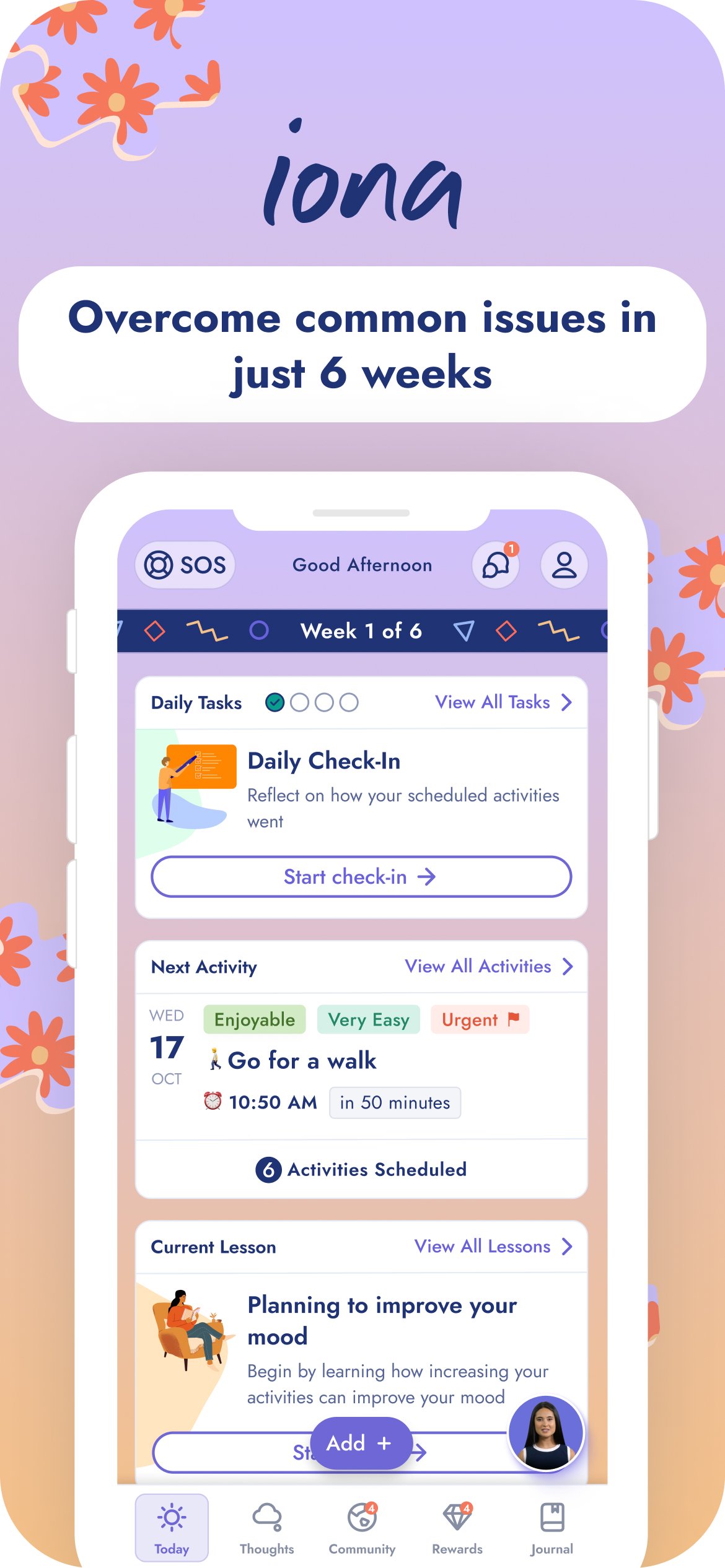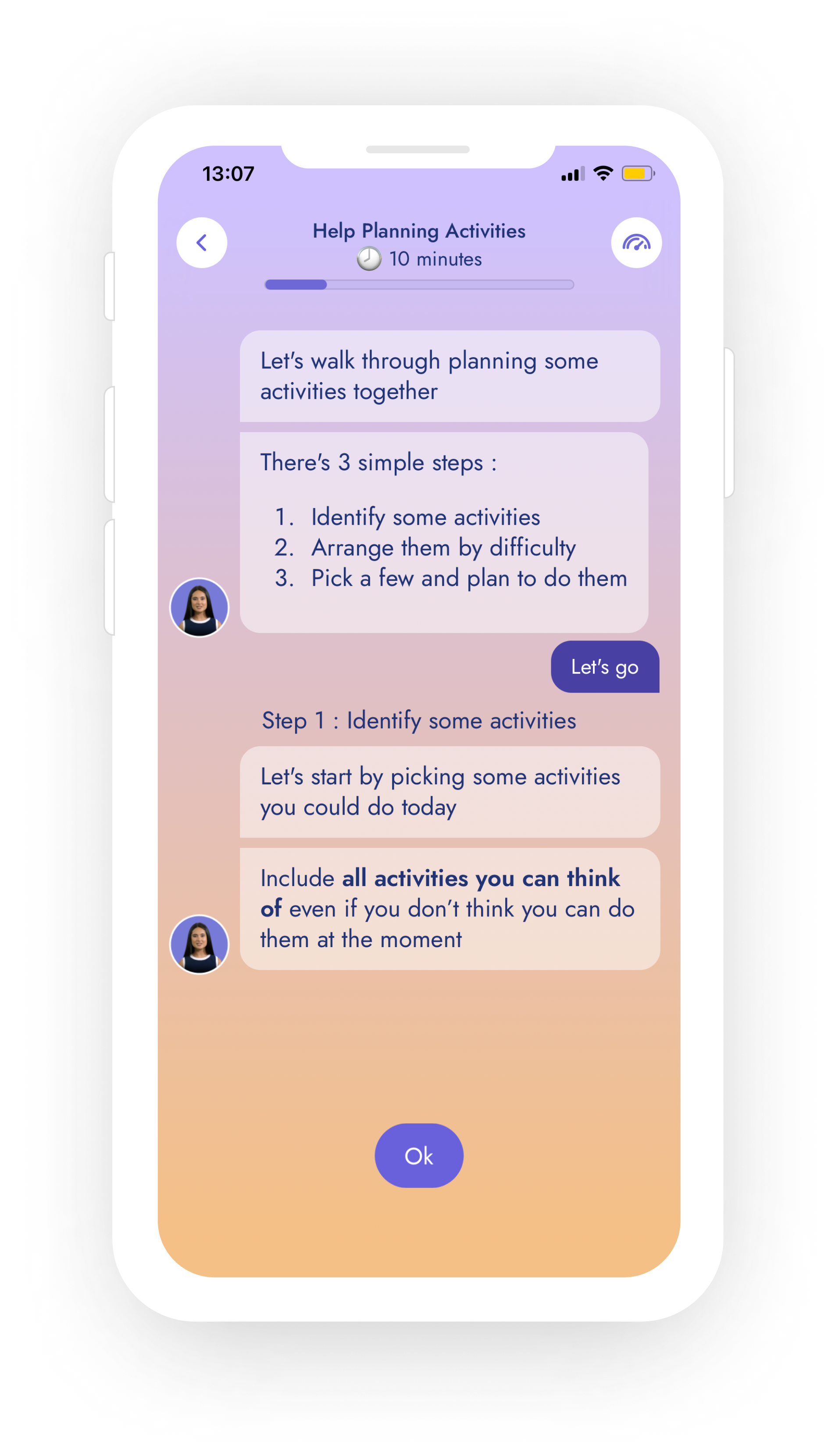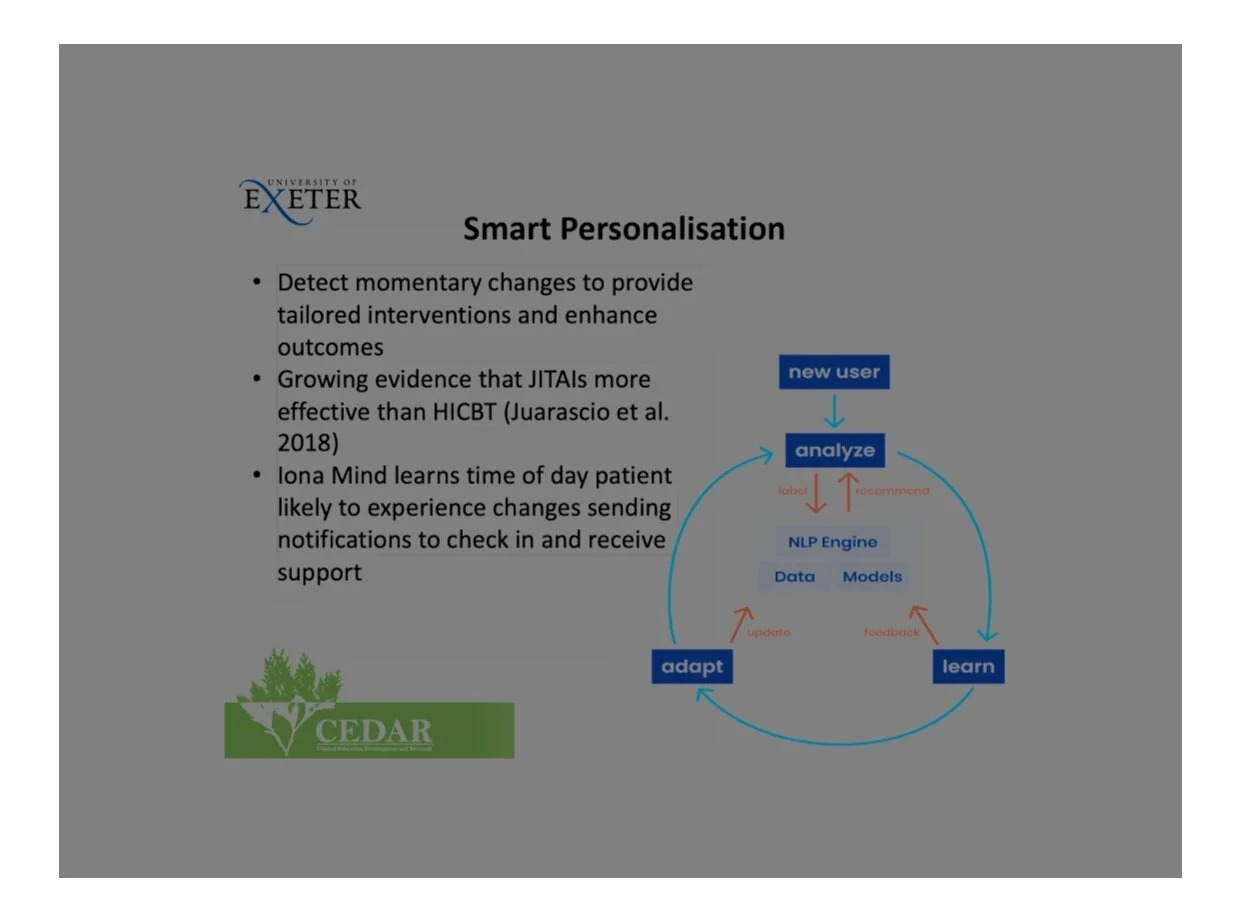
The leaders in low-intensity cognitive behavioral therapy solutions
Iona Mind leads the development and implementation of low-intensity behavioral health technologies globally
Leading research and development
The Iona Mind Clinical Team is lead by Professor Paul Farrand, a world leading authority in low-intensity cognitive behavioral therapy (LICBT), having edited the first international LICBT textbook. Paul sits on the NHS Talking Therapies Expert Advisory Committee and the NICE Medical Technologies Advisory Group.
As an author of the COBRA (Cost and Outcome of Behavioural Activation versus Cognitive Behavioural Therapy for Depression) study (published in the Lancet), the largest of its kind, he showed that low-intensity CBT was more cost effective than traditional approaches. This lead to its global adoption with a significant footprint in the UK, Canada and Australia.
The Iona Research Approach
Iona Mind has developed an evidence informed framework for developing app-based psychological wellbeing tools based upon clinical best practice.
We adopt a health services research approach to apply a systematic framework to inform development, definitive evaluation and implementation of our products.
Learn more about the Iona Mind approach in our paper on evidence informed practice.
Maximizing the impact and reach of psychological support
To address long waiting times, lack of acceptability and barriers to accessing support for common mental health issues, there was a revolution in the way evidence-based psychological therapies are delivered. Starting in England, this revolution has been achieved through the development, research and implementation of Low-Intensity Cognitive Behavioural Therapy (CBT) - our specialism at Iona Mind.
Learn more about the low-intensity CBT revolution in our paper on extending the reach of evidence-based psychological therapies.
Leading design and user experience






Low-intensity cognitive restructuring
Low-intensity approaches use health technologies to enable anyone to work at their own pace within their own time.
Low-intensity approaches focus on addressing problems in the ‘here and now’, which makes them suitable to be delivered digitally.
Low-intensity behavioral activation
Low-intensity behavioral approaches are effective in supporting recovery across a number of conditions.
Digital behaviornal health improves access to evidence-based psychological therapy.
Explore the Iona Mind Platform
The evidence-base and health economics of low-intensity behavioral health technologies
Learn more about the evidence base and health economics behind LICBT in our paper.
People with depression are nearly 30% less healthy on average than those without it and use healthcare services more than other commercially insured Americans. This results in more than two times higher overall healthcare spending ($10,673 compared to $4,283). These findings come from the Blue Cross Blue Shield Health index which is built on claims data from 41 million commercially insured Americans.
Only 11% of people are solely diagnosed with depression. 7% have a diagnosis comorbid with another condition, whilst the vast majority experience multi-morbidity, with 82% having two or more additional health conditions.
Committed to public involvement & patient advocacy
Iona Mind has a structured and proprietary formula for co-developing products with your members.
Patient advocate groups (PAG) and patient & public involvement (PPI) inform our product adaptions to ensure all solutions are customized for the people you serve.
Accessibility, diversity and inclusion are built in and tested from the beginning. Meanwhile, cultural adaptations can enhance acceptability and usability.
Our unique custom approach
We design customized behavioral health products for your population in just 12 weeks and offer full implementation support
The Iona Mind Development Program is a structured program of collaboration between Iona Mind and the sponsoring organization to build behavioral health products that meet the needs of its members.
The Iona Mind clinical development team has significant expertise in intervention development, currently leading a range of programs and conducting wider research into a range of areas including carers of people with dementia, end-stage renal failure, parents of children being treated for cancer and the Muslim community.
Cutting edge technology
Low-Intensity Cognitive Behavioural Therapy (LICBT) is a health technology where CBT techniques are delivered in a self-guided way.
Watch our presentation at the University of Washington, Department of Psychiatry & Behavioral Sciences, Grand Rounds: "Low-Intensity CBT: Driving Revolution in Mental Health Care" where we discuss the opportunities technology offers to deliver exceptional solutions.
FAQs
Low-intensity Cognitive Behavioral Therapy
-
Low-intensity Cognitive Behavioral Therapy (CBT) is a streamlined, cost-effective approach to delivering cognitive behavioral therapy. It is designed to be less resource-intensive than traditional CBT, involving shorter, more focused interventions, often delivered through guided self-help or digital platforms. Typically, these interventions involve less direct contact time with therapists, making them more accessible to a larger number of people.
-
Low-intensity CBT was developed to address the growing demand for mental health services and the shortage of trained therapists. With high prevalence rates of mental health conditions like anxiety and depression, there was a need for scalable and cost-effective treatments that could reach more individuals. The UK's Improving Access to Psychological Therapies (IAPT) program, launched in 2006, was a significant driver in developing and implementing low-intensity CBT. The program aimed to provide evidence-based psychological therapies to a broader population, particularly for those with mild to moderate mental health issues (BioMed Central) (Oxford Academic).
-
Low-intensity CBT has been widely implemented in the United Kingdom through the IAPT program which treats millions of patients each year and serves as a model for similar initiatives globally. It is also used in various healthcare systems across Europe, North America, and Australia. These interventions are often integrated into public health services, primary care settings, and online platforms, making them accessible to a diverse range of patients (BioMed Central).
-
Research indicates that low-intensity CBT is effective for treating common mental health conditions. A meta-analysis found that low-intensity CBT significantly reduces symptoms of generalized anxiety disorder, with outcomes comparable to traditional CBT in some cases (BioMed Central). The COBRA study also showed that simpler interventions like Behavioral Activation, a component of low-intensity CBT, are as effective as traditional CBT for depression and more cost-effective (BioMed Central). These findings support the broader adoption of low-intensity approaches as a viable option for mental health treatment in modern care settings and beyond.
-
Low-intensity CBT has proven to be cost-effective, which is one of its primary advantages. By requiring less therapist time and leveraging self-help and digital tools, it reduces the cost per patient compared to traditional, high-intensity CBT. Studies, including the COBRA study, highlight that low-intensity interventions like Behavioral Activation can deliver significant cost savings while maintaining clinical effectiveness (BioMed Central) (Oxford Academic).
Built utilizing peer-reviewed psychological research





























